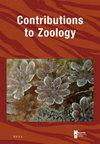Spatial genetic structure in the Eurasian otter (Lutra lutra) meta-population from its core range in Italy
IF 2.2
2区 生物学
Q1 ZOOLOGY
引用次数: 6
Abstract
We characterized the genetic structure of the Eurasian otter (Lutra lutra) meta-population living in the core of its Italian distribution range providing results from 191 fresh spraints, collected from 24 watercourses included in Southern Italy. Furthermore, according to ecological corridors and barriers, we discuss the likely ways of movement and possible evolutionary fate of these populations. We genotyped 136 samples using 11 Lut microsatellite nuclear markers amplified from faecal dna. Microsatellites were moderately variable (Ho = 0.45; He = 0.46), with a total number of alleles and average number of alleles per locus in the meta-population of 50 and 4.54, respectively. No significant heterozygosity excess was observed in meta-population suggesting no recent population bottlenecks. Bayesian clustering discriminated a sub-structuring of the meta-population in five putative clusters, indicating that local populations are genetically differentiated: three of these seem to be identifiable with geographically defined sub-populations (from the Cilento, Agri and Basento river basins). The fourth is represented by multiple sub-populations with admixed genotype, that include genotypes from the Lao, Sinni and Abatemaco river basins, living in a landscape with the higher environmental permeability. Landscape genetic analysis could provide evidence of an unexpected ecological corridor: the seacoast, highlighted, for the first time as a new way for the dispersion of the South-Italian otters. Deepening the knowledge of these perspectives is crucial to identify solid strategies aimed at the future health of the populations of the Italian otters, by restoring dispersal corridors and managing the watercourses.意大利核心区域欧亚水獭(Lutra Lutra)元种群的空间遗传结构
我们对生活在其意大利分布范围核心的欧亚水獭(Lutra Lutra)元种群的遗传结构进行了表征,并提供了从意大利南部24条水道收集的191个新鲜样本的结果。在此基础上,根据生态廊道和生态屏障,讨论了这些种群可能的迁移方式和可能的进化命运。我们使用从粪便dna中扩增的11个Lut微卫星核标记对136个样本进行了基因分型。微卫星是中度可变的(Ho = 0.45;He = 0.46),总等位基因数为50,每个位点平均等位基因数为4.54。在大群体中没有观察到明显的杂合度过剩,这表明近期没有群体瓶颈。贝叶斯聚类在5个假定的聚类中区分出了元种群的一个子结构,表明当地种群具有遗传差异:其中3个似乎可以通过地理上定义的亚种群(来自Cilento、Agri和Basento河流域)来识别。第四种是多亚种群的混合基因型,包括来自Lao、Sinni和Abatemaco河流域的基因型,生活在环境渗透率较高的景观中。景观遗传分析可以提供一个意想不到的生态走廊的证据:海岸,首次被强调为南意大利水獭分散的新途径。加深对这些观点的了解对于确定旨在意大利水獭种群未来健康的坚实战略至关重要,方法是恢复扩散走廊和管理水道。
本文章由计算机程序翻译,如有差异,请以英文原文为准。
求助全文
约1分钟内获得全文
求助全文
来源期刊

Contributions to Zoology
生物-动物学
CiteScore
4.00
自引率
4.50%
发文量
16
审稿时长
>12 weeks
期刊介绍:
Contributions to Zoology solicits high-quality papers in all systematics-related branches of comparative zoology (including paleozoology). Preference will be given to manuscripts dealing with conceptual issues and to integrative papers (e.g., ecology and biodiversity, morphology and phylogeny and character state evolution, phylogeny and historical biogeography, systematics and bioinformatics, bioinformatics and biodiversity, habitat disturbance and biogeography, etc.). Reviews and alpha-taxonomic contributions are considered for publication, but acceptance will depend on their high quality and exceptional nature.
 求助内容:
求助内容: 应助结果提醒方式:
应助结果提醒方式:


